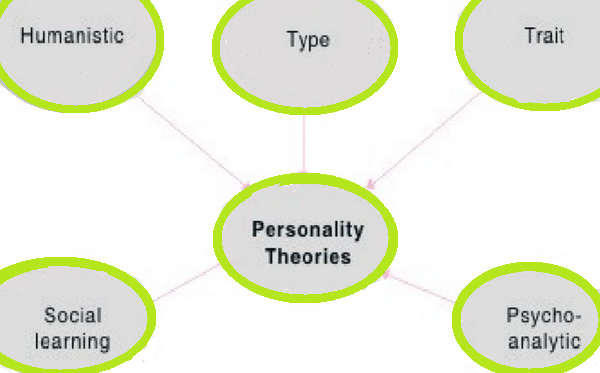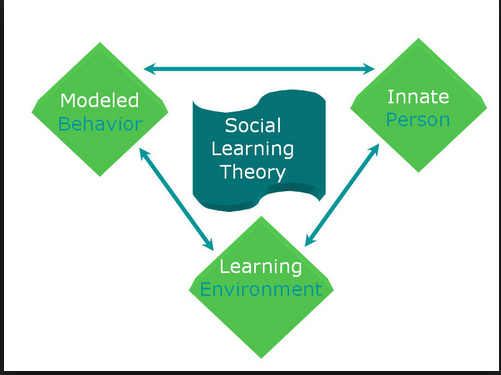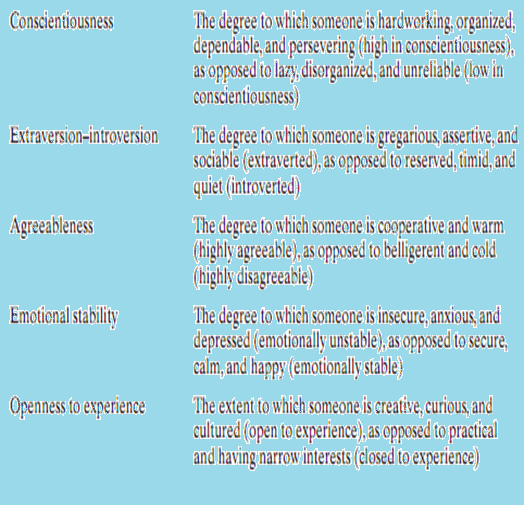The Individual Processes – Personality (Organisational Behaviour and Design)
In management literature, it has been demonstrated that there are several basic psychological processes responsible for key aspects of people's behaviour in organizations. Personality is the exceptional and relatively stable pattern of behaviour, thoughts, and emotions shown by individuals. Briefly, personality refers to the lasting ways in which any one person is different from all others. Personality is used to describe people. Psychologists defined personality as strong pillar on which individual processes stand and is comparatively a blueprint of how person behave in organizational set-up. In fact, it explains our behavioural patterns by referring to our internal states. Personality is related with consistent patterns of behaviour, cognition, and emotion in individuals. The study of personality in organizations has generally focused on the relation of particular traits to employee performance. Personality is a vital individual trait, which explicates why several companies try to assess the personality traits of job applicants and employees. According to theorists, Personality is the comparatively enduring pattern of thoughts, emotions, and behaviours that differentiate a person, along with the psychological processes behind those characteristics. It is the array of qualities that make people similar to or different from other people. It can assess an individual's personality by what he or she says and does, and people infer the person's internal states including thoughts and emotions-from these observable behaviours. In today's competitive business environment, huge organizations are recognizing more importance of personality when recruiting for candidates to fill job openings. Various traits such as openness, emotional stability, and agreeableness all predict that an individual will have less conflict, work better in teams, and have positive attitudes about his or her work. People with this type of personality should be placed in situations where they would be working with or leading others. Those who do not have these traits will have less motivation and be more negative when they are placed in these situations.
Positive interpersonal skills are a personality trait that greatly affects the workplace. Individuals who exhibit this trait generally enjoy working with other people, and they have the empathy and sensitivity that enables them to get along well with others. People with this trait are often placed in roles where they work with customers, manage employees, or mediate problems. Decision-making and independence are very much affected by personality. Personality qualities such as self-efficacy, conscientiousness, and pro-activity contribute to good decision-making under pressure and independence, while traits such as neuroticism and not being open do not. Managers can place individuals with these traits in suitable positions to do their best work. Placing individuals with certain characteristics in jobs that best suit them raises their levels of inspiration. It also affects their general job performance because they are comfortable on regular basis. This affects the overall efficiency of the workplace. There are several factors that influence the shaping of personality such as Heredity, Culture, Family Background, Our Experiences through Life and The People we interact with.
Theoretical structure of personality: Numerous theories are developed to explain personality that has immense influence in organizational set up.

Traits Theory: It is important in theoretical framework of personality. It viewed personality as revolving around attempts to identify and label permanent characteristics that describe an individual's behaviour. Different characteristics or traits include shyness, aggressiveness, submissiveness, laziness, ambition, loyalty, and timidity. Allport's theory of personality highlights the exceptionality of the individual and the internal cognitive and motivational processes that influence behaviour for example, intelligence, temperament, habits, skills, attitudes, and traits. Allport (1937) thinks that personality is biologically determined at birth, and shaped by a person's environmental experiences. Cattell differentiated between surface traits, which are observable patterns of behaviour, and source traits, which he viewed as underlying, internal traits responsible for our overt behaviour. He viewed the source traits as more important. Source traits can be identified only by means of computer analysis of all the collected data. Cattell also distinguishes between general traits those possessed by all and specific traits those typical of only one person.
Cognitive Theory of Personality
Cognitive theory emphasizes individual's thoughts as the determinate of his or her emotions and behaviours and therefore personality. Many cognitive theorists consider that without these thought processes, we could have no emotions and no behaviour and would therefore not function. Thoughts always come before any feeling and before any action. The cognitive perspective of personality is the idea that people are who they are because of the way they think, including how information is attended to, perceived, analysed, interpreted, encoded and retrieved. People tend to have habitual thinking patterns which are characterized as personality. Person's personality, then, would be his characteristic cognitive patterns. The cognitive viewpoint is that personality is a person's mental organization. In order to cope with all the information people receive from the world, including sensory information, they need to cope with, integrate and organise all the information in the world.
Humanistic Theory
The humanistic viewpoint focuses on the positive image of what it means to be human. Human nature is visualized as basically good, and humanistic theorists focus on methods that allow fulfilment of potential. Abraham Maslow proposed that an individual is motivated by a hierarchy of needs. Basic needs must be met before higher ones can be satisfied. Arranged in order from lowest to highest (in a hierarchy), the needs are physiological (satisfaction of hunger and thirst), safety (security), belongingness and love (being loved, avoiding loneliness), esteem (achievement, recognition, self-esteem), self-actualization (realization of one's full potential). Maslow also believed that the achievement of selfactualization is often marked by peak experiences, feelings of incredible peace and happiness in the course of life activities.
Psychodynamic Theory
It was proposed by Sigmund Freud, founder of psychoanalysis, in his theory, there are 3 elements of personality that are id is driven by internal and basic drives and needs, which are typically instinctual such as hunger, thirst, and the drive for sex, or libido. Acts in accordance with the pleasure principle in that it avoids pain and seeks pleasure. Due to the instinctual quality of the id, it is impulsive and often unaware of implications of actions. Ego works to balance both the id and superego by working to achieve the id's drive in the most realistic ways. It is driven by the reality principle. Super ego is driven by the morality principle in connection with the morality of higher thought and action. Personality development depends on the interplay of instinct and environment during the first five years of life. Parental behaviour is crucial to normal and abnormal development. Personality and mental health problems in adulthood can usually be traced back to the first five years.
American psychologist Henry Murray devised a theory of personality that was organized in terms of motives, presses, and needs. Murray explaineda needs as a, "potentiality or readiness to respond in a certain way under certain given circumstances" (1938). Theories of personality based upon needs and motives propose that our personalities are a reflection of behaviours controlled by needs. While some needs are momentary and changing, other needs are more deeply seated in our nature. According to Murray, these psychogenic needs function mostly on the unconscious level, but play a major role in our personality.
Social Learning Theories of Personality
Social learning theory is rooted in the behaviourist concept of human behaviour which is determined by learning particularly as shaped by reinforcement in the form of rewards or punishment. Social learning theory combines cognitive learning theory which posits that learning is influenced by psychological factors and behavioural learning theory which assumes that learning is based on responses to environmental stimuli.

Various research studies in behaviourism conducted by Ivan Pavlov, John Watson, and B. F. Skinner used animals in a laboratory. The social learning theories of Albert Bandura put emphasis on the reciprocal relationship among cognition, behaviour, and environment, for which Bandura coined the term reciprocal determinism. Bandura's theory has three primary components which include your behaviour, the environment in which person behave and observe others' behaviour, and self-efficacy that is person's your beliefs about his ability to perform the behaviours required to achieve the outcomes he desires.
Psychologists concur that environmental factors interact with genetic factors to form personality. Some psychologists have developed theories that focus these genetic influences on personality. Hans Eysenck considers that genetics are the prime determinate of personality, although he thinks conditioning also plays major role in personality development. According to Eysenck, personality traits are hierarchical, with a few basic traits giving rise to a large array of more superficial traits. Genetically determined differences in physiological functioning make some people more vulnerable to behavioural conditioning. Eysenck proposes that introverted people have higher levels of physiological arousal, which allows them to be conditioned by environmental stimuli more easily. Because of this, such people develop more inhibitions, which make them more shy and uneasy in social situations.
There are five dimensions of personality. These dimensions of personality has significant role in organizational behaviour. Many studies revealed that employees who are highly careful and tend to perform better than those who are not so hard-working. Organizational experts also have found that people who are highly extraverted tend to achieve something on managerial and sales jobs much as the stereotype suggests.
Table: Five Dimensions of Personality (Jerald Greenberg, 2005)
Conscientiousness refers to the degree to which a person is organized, systematic, punctual, achievement-oriented, and dependable. Conscientiousness is the one personality trait that uniformly predicts how high a person's performance will be across a variety of occupations and jobs. In fact, conscientiousness is the trait most desired by recruiters, and highly conscientious applicants tend to succeed in interviews.
Extraversion is the degree to which a person is outgoing, talkative, sociable, and enjoys socializing. One of the established findings is that they tend to be effective in jobs involving sales.
Agreeableness is the degree to which a person is affable, tolerant, sensitive, trusting, kind, and warm. In other words, people who are high in agreeableness are likeable people who get along with others. Not surprisingly, agreeable people help others at work consistently. This helping behaviour does not depend on their good mood.
Neuroticism refers to the degree to which a person is anxious, irritable, temperamental, and moody. It is perhaps the only Big Five dimension where scoring high is undesirable. Neurotic people have a tendency to have emotional adjustment problems and habitually experience stress and depression. People very high in Neuroticism experience a number of problems at work.
Openness is the degree to which a person is curious, original, intellectual, creative, and open to new ideas. People high in openness seem to thrive in situations that require flexibility and learning new things. They are highly motivated to learn new skills, and they do well in training settings.
The five-factor model of personality is supported in research but it is not the most popular in practice. Famous psychiatrist Carl Jung proposed that personality is mainly represented by the individual's preferences regarding perceiving and judging information. Jung stated that perceiving, which involves how people prefer to gather information or perceive the world around them, occurs through two competing orientations; sensing and intuition. Sensing involves perceiving information directly through the five senses; it relies on an organized structure to acquire factual and preferably quantitative details. Intuition depends on insight and subjective experience to see relationships among variables. Sensing types focus on the here and now, whereas intuitive types focus more on future possibilities. Jung avowed that judging how people process information or make decisions based on what they have perceived consists of two competing processes which include thinking and feeling. People with a thinking orientation rely on rational cause-and-effect logic and systematic data collection to make decisions. Those with a strong feeling orientation rely on their emotional responses to the options presented, as well as to how those choices affect others. Jung established that people also differ in their degrees of extraversion-introversion, which was one of the Big Five personality traits.
There are other Personality Dimensions also. Self-monitoring denotes to the extent to which a person is competent of monitoring his or her actions and appearance in social situations. People who are social monitors are social chameleons who comprehend what the situation demands and act accordingly, while low social monitors tend to act the way they feel. Another dimension of personality is proactive personality which states person's inclination to fix what is wrong, change things, and use plan to solve problems. Instead of waiting to be told what to do, proactive people take action to initiate meaningful change and remove the obstacles they face along the way. Proactive individuals tend to be more successful in their job searches. Self-esteem is the level to which a person has general positive feelings about himself or herself. People with high self-esteem view themselves in a positive light, are convinced, and respect themselves. People with low self-esteem experience high levels of self-doubt and question their self-worth. High self-esteem is related to higher levels of satisfaction with one's job and higher levels of performance on the job. Self-efficacy is another dimension of personality which states that one can perform a specific task effectively. Research shows that the belief that people can do something is a good predictor of whether they can actually do it. Self-efficacy is different from other personality traits in that it is job specific.
Personality is a predictor of work behaviour. In job interviews, companies try to assess a candidate's personality and the potential for a good match, but interviews are only as good as the people conducting them. In fact, interviewers are not particularly good at detecting the best trait that predicts performance. One method many organizations adopt use to improve this match and detect the people who are potentially good job candidates is personality testing. Several companies conduct pre-employment personality tests. Companies using them consider that these tests improve the effectiveness of their selection and reduce turnover.
To summarise, personality contributes considerably in organizational behaviour because the way that people think, feel, and behave greatly influence many aspects of the workplace. People's personalities affect their behaviour in groups, their attitudes, and the way they make decisions. Interpersonal skills vastly affect the way that people act and respond to process during work. In the workplace, personality also affects in various factors such as motivation, leadership, performance, and conflict. The more those managers recognize how personality in organizational behaviour works, the better equipped they are to be successful and accomplish their goals. People have many different visions of the world that influence their personalities. When a situation arises, an individual will handle it based upon his or her personal values, beliefs, and personality traits. These qualities are developed throughout a person's lifetime and cannot be easily transformed, so it is useful for managers to understand this rather than to struggle it. Big Five personality dimensions that include openness, conscientiousness, extraversion, agreeableness, and Neuroticism are important traits. Others that are particularly applicable for work behaviour include self-efficacy, self-esteem, social monitoring, and proactive personality. While personality had great influence over job attitudes, its relation to job performance is weaker. Some organizations use personality testing to screen out candidates. Companies using personality tests are advised to authenticate their tests and use them to supplement other techniques with greater validity, such as tests of cognitive ability.
